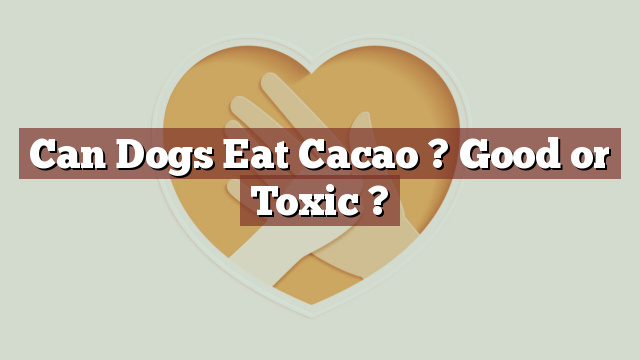Can Dogs Eat Cacao? Good or Toxic?
As responsible pet owners, it is crucial to be aware of what foods are safe for our furry friends to consume. One particular food that often raises questions is cacao. Many of us enjoy indulging in chocolate and other cacao-based products, but can our dogs safely enjoy them too? In this article, we will explore the nutritional value of cacao, its safety for dogs, potential risks and benefits, and what you should do if your dog accidentally ingests cacao.
Nutritional Value of Cacao: Macronutrients and Micronutrients Explained
Cacao comes from the Theobroma cacao tree and is the key ingredient in chocolate. It contains various macronutrients and micronutrients that provide potential health benefits for humans. For instance, cacao is rich in fiber, iron, magnesium, and antioxidants. These components are known to support cardiovascular health, improve mood, and boost brain function.
Is Cacao Safe for Dogs? Understanding the Risks and Toxicity Levels
Can dogs eat cacao? The answer is a resounding no. While cacao offers health benefits for humans, it poses significant risks to our canine companions. The presence of theobromine and caffeine in cacao products makes them extremely toxic to dogs. Theobromine affects the central nervous system and cardiovascular function, while caffeine stimulates the dog’s central nervous system.
Dogs, unlike humans, metabolize these substances much more slowly, making it difficult for their bodies to eliminate them efficiently. Consequently, theobromine and caffeine can accumulate to toxic levels in a dog’s system, leading to various symptoms ranging from mild to severe. These symptoms may include increased heart rate, restlessness, diarrhea, vomiting, tremors, seizures, and even fatal conditions.
Potential Risks and Benefits of Dogs Consuming Cacao Products
While the risks associated with dogs consuming cacao products are clear, it is important to note that some pet owners may argue that their dogs have eaten small amounts of chocolate without any adverse effects. While this may be true in some cases, it is essential to remember that every dog’s tolerance and reaction to cacao can vary. What may be harmless for one dog could prove fatal for another.
The potential benefits of cacao do not outweigh the serious risks it poses to dogs. It is not worth taking the chance with your pet’s well-being by allowing them to consume any cacao-based products.
My Dog Ate Cacao, What Should I Do? Steps to Take Immediately
If you suspect or know that your dog has ingested cacao or any chocolate-based product, it is crucial to take immediate action. Time is of the essence when dealing with chocolate toxicity in dogs. Here are the steps you should take:
- Stay calm: Panicking will not help the situation. Take a deep breath and focus on your dog’s well-being.
- Contact a veterinarian: Call your vet right away and provide them with all the necessary information regarding the amount and type of cacao your dog has consumed. They will guide you on the next steps to take.
- Monitor your dog: Keep a close eye on your dog for any signs of distress or symptoms associated with chocolate toxicity. The earlier these symptoms are identified, the better the chances of successful treatment.
- Do not induce vomiting: Unlike some toxic substances, inducing vomiting is not recommended when dealing with chocolate ingestion. It is best to follow your vet’s advice on how to proceed.
Conclusion: The Importance of Avoiding Cacao for Canine Health
In conclusion, it is vital to understand that cacao is not safe for dogs to consume. The theobromine and caffeine present in cacao products can have severe toxic effects on our furry friends. The potential risks far outweigh any potential benefits. As responsible pet owners, it is our duty to keep our dogs away from any cacao-based products.
If you suspect your dog has consumed cacao or any chocolate-containing item, waste no time in contacting your veterinarian. They will provide you with the necessary guidance and treatment options to ensure the well-being of your beloved pet. Remember, prevention is always better than cure when it comes to the health and safety of our furry companions.
Thank you for investing your time in exploring [page_title] on Can-Eat.org. Our goal is to provide readers like you with thorough and reliable information about various dietary topics. Each article, including [page_title], stems from diligent research and a passion for understanding the nuances of our food choices. We believe that knowledge is a vital step towards making informed and healthy decisions. However, while "[page_title]" sheds light on its specific topic, it's crucial to remember that everyone's body reacts differently to foods and dietary changes. What might be beneficial for one person could have different effects on another. Before you consider integrating suggestions or insights from "[page_title]" into your diet, it's always wise to consult with a nutritionist or healthcare professional. Their specialized knowledge ensures that you're making choices best suited to your individual health needs. As you navigate [page_title], be mindful of potential allergies, intolerances, or unique dietary requirements you may have. No singular article can capture the vast diversity of human health, and individualized guidance is invaluable. The content provided in [page_title] serves as a general guide. It is not, by any means, a substitute for personalized medical or nutritional advice. Your health should always be the top priority, and professional guidance is the best path forward. In your journey towards a balanced and nutritious lifestyle, we hope that [page_title] serves as a helpful stepping stone. Remember, informed decisions lead to healthier outcomes. Thank you for trusting Can-Eat.org. Continue exploring, learning, and prioritizing your health. Cheers to a well-informed and healthier future!

